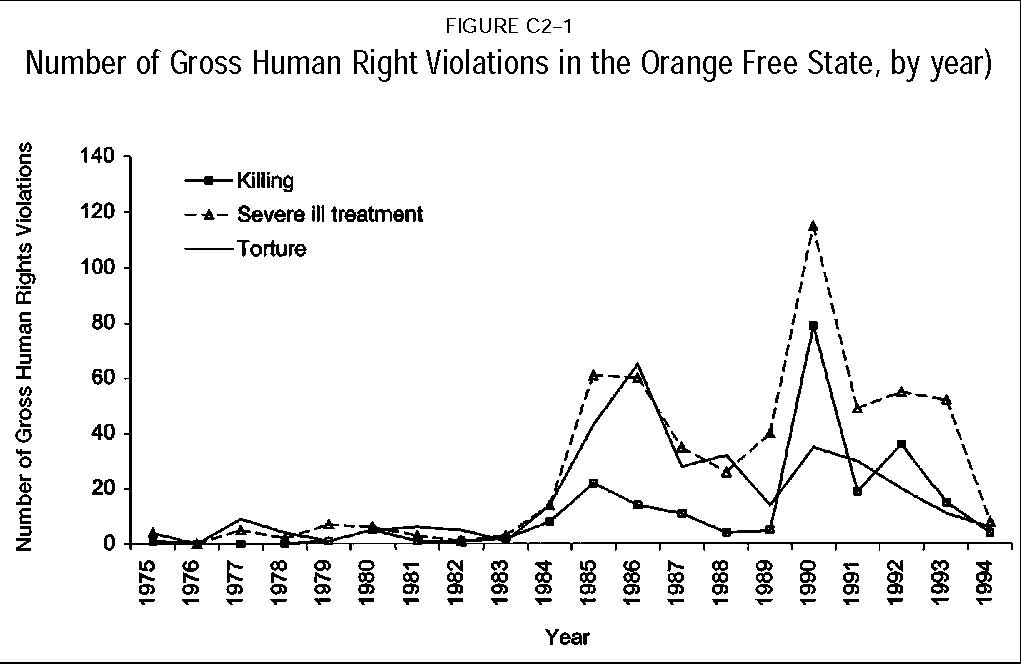 |
News | Sport | TV | Radio | Education | TV Licenses | Contact Us |
 |
News | Sport | TV | Radio | Education | TV Licenses | Contact Us |
TRC Final ReportPage Number (Original) 334 Paragraph Numbers 23 to 28 Volume 3 Chapter 4 Subsection 3 Overview of Violations23 The KwaZulu-Natal regional office of the Commission was allocated the task of administering the submissions received from victims of violations in the Orange Free State. To this end, officers of the Commission were assigned to sub-regional offices in the Free State, and teams of statement-takers were sent to towns around the province in order to gather a wide range of evidence of violations. The Amnesty Committee and the Human Rights Violations Committee of the Commission held hearings in the main towns in the province. Comparatively few statements were received from the Orange Free State, the total representing no more than a fifth of all the statements received and administered by the Commission’s Durban office. 24 Most of the reports of human rights violations from the Orange Free State were received for the late 1980s and early 1990s, when resistance to apartheid structures and policies was at its most intense in the province and in the country as a whole. 25 Up to 68 per cent of statements referred to violations that resulted from police action. Of these, 45 per cent of cases related to shooting by the police (40 per cent fatal), and 27 per cent to torture and assault, predominantly of detainees. Families often bore the brunt of this conflict as they suffered bereavement and loss, often of economically active members or potential breadwinners. A remarkable number of violations perpetrated by the police resulted in permanent physical disability and psychological damage. Twelve cases of blinding as a result of police shooting were reported.  26 Other areas of social and political life in which violations were recorded by the Commission focused on civil conflict due, inter alia, to local councils imposing rental and service charge increases on township residents, vigilante activities and the conflict surrounding attempts to incorporate the township of Botshabelo into QwaQwa. Violations were also recorded in clashes between protesting students and the police during school boycotts, and between workers and the police, together with other groupings, in the course of labour activities. By the mid-1980s, young people (aged thirteen to twenty-four) were at the front line of resistance activities that resulted in clashes with the security forces. 27 Many deponents from the Orange Free State told the Commission that they had been victims of assault and attack, including social and economic deprivation, purely on the basis of race. The Commission was not always able to make a positive finding in respect of such cases, particularly when no clear-cut political motive was identifiable. There was a substantial number of reports and allegations of the frequent eruption of conflict between white farmers, white political organisations and the security forces on the one hand, and ordinary black farm workers and township residents on the other. This supports the impression that race relations in the province were particularly strained and social conditions deeply repressive in the province. It is against this background of racial tension, inequality and polarisation that the Commission has considered the submissions received from victims of violations in all spheres of social life in the province. 28 A review of the violations reported by victims in the Orange Free State reveals a steady increase in the number of politically-motivated killings and cases of severe ill treatment throughout the 1980s, both peaking in the nineties. Perpetrator groups appear to become more diversified towards the end of the 1980s and in the early 1990s. Whereas most reported violations in the 1960–83 review periods are attributed to the state security forces, later periods show an increase in the number of abuses perpetrated by groups allied to the liberation movements – the African National Congress (ANC) self-defence units (SDUs), the Azanian People’s Liberation Army (APLA), vigilante groups and other surrogate forces. |